Boko Haram crisis: The victims who fled over Lake Chad
- Published
The BBC's Thomas Fessy speaks to some of the refugees who fled Baga
Seven-year-old Fatima lies on her own in a big white tent, crying inconsolably and calling for her father who was killed by Boko Haram militants in Nigeria.
She escaped with the rest of her family across Lake Chad after the attack on the town of Baga by the Islamist group earlier this month.
A field officer from the UN children's agency, Unicef, helps us find her mother, Hadija Umar, 30, a bit further in the camp.
She is queuing among hundreds for a bucket, some soap and a mosquito net.
"I am on my own with my three girls; my husband was killed," she says, carrying a three-month-old on her back.
"He had gone to buy fish when Boko Haram fighters launched their attack.
"Women told me that they found his body floating in the lake, his hands tied and his throat cut."
Ms Umar could not even go to see the body for herself and mourn her husband. She ran with their small girls.
'Hunted down'
It has been difficult to piece together what exactly happened during the assault on Baga and surrounding villages.
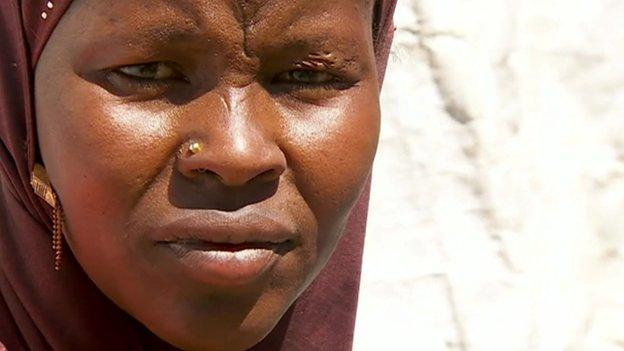
Hadija Umar is caring for three children on her own after her husband was killed
To find out more from witnesses who escaped involved a 15-hour journey into the desert from the Chadian capital, N'Djamena.
We set off early on sandy tracks, drove through rivers, and were carried across others on rafts made of oil drums and wooden planks.
Finally, we climbed into a dug-out canoe for the last leg of the journey to Ngouboua, a quasi-island in Lake Chad, where some of the thousands who fled Baga have sought refuge.
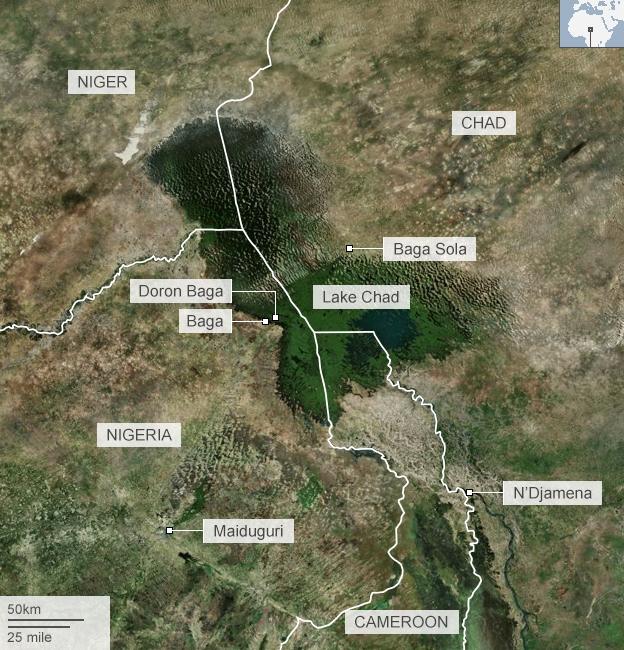
Most of the women, children and men here have lost relatives in the attack. They say Boko Haram fighters hunted them down as they ran into the bush.
There have been claims that as many as 2,000 people were massacred in and around Baga. This count was certainly an overestimate but there is no doubt that hundreds lost their lives in this brutal assault.
Whatever happened on the day of the attack, it is clear that there was absolute panic.
People fled in all directions; families scattered and many are now separated with no means of finding each other again.
Cold nights
More than 100 children arrived on Ngouboua unaccompanied, according to the UN.
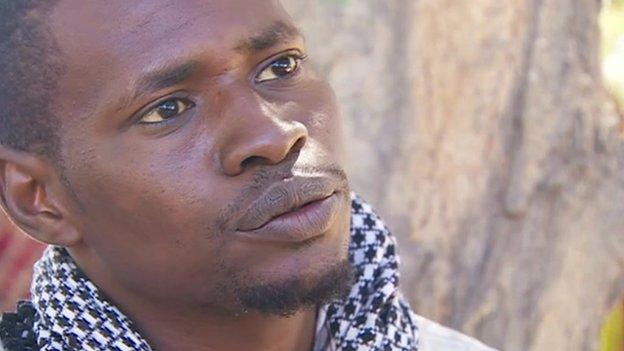
Haroun Mohamed lost his wife and baby in the chaos
Haroun Mohamed, 31, was among the adults who made it here, alone. In the terrifying confusion, he lost sight of his wife and their baby.
He has not heard from the rest of his family either.
"I don't know if they are all alive or if some of them have died," he says.
"I am angry, so angry and sad. I cannot sleep at night, I am just thinking about them."
Mr Mohamed has to spend his sleepless nights in the cold.

Capture of Baga
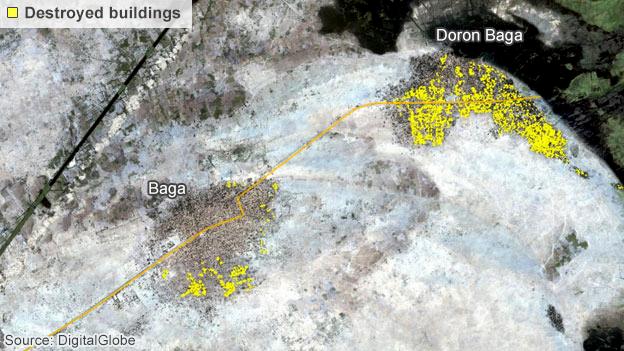
Satellite images show the destruction in Baga and Doron Baga after the Boko Haram assaults
3 January: Social media reports of Baga attack first emerge
4 January: Boko Haram claims to have captured Baga
8 January: Reports emerge of bodies strewn on the streets in Baga, with some saying 2,000 people killed
12 January: The government says that the number of people who lost their lives in Baga was no more than 150, including militants
15 January: Satellite images released by Amnesty International suggest the number of dead is far higher than officially admitted

Everyone on this island arrived with nothing. Not an extra pair of trousers, not even a blanket.
At this time of year, the sun is high and warm during the day but the temperature drops dramatically at night and the wind picks up.
Aid agencies are slowly starting to distribute essential supplies but access to this remote area is a problem.
The Lake Chad region is the poorest in a country ranked at the bottom of the UN Human Development Index.
'Chad nervous'
"This sudden influx of refugees poses a risk of epidemic outbreak," says Dr Bobo Makoso from the International Medical Corps.
"Agencies are trying to guarantee that everybody is vaccinated against measles and meningitis upon arrival."
People are continuing to arrive here every day, usually in groups of 15 to 20.
The UNHCR says it cannot predict how many more will cross the lake to Chad but it is preparing for the possibility of another 20,000 arriving within the next three months.
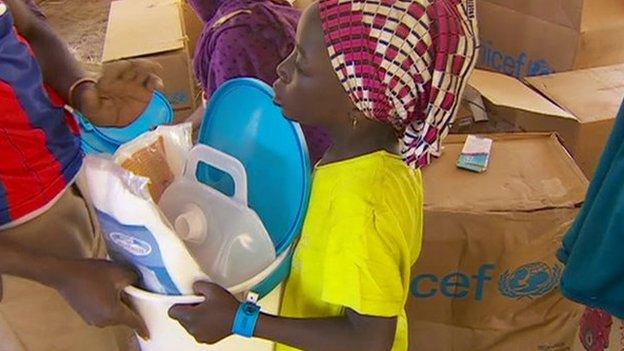
The UN is distributing essential supplies to those who fled to the islands
In the meantime, it has started to relocate refugees to a site in Baga-Sola, a two-and-a-half-hour journey from the islands in the lake, where they have landed.
Unlike neighbouring Cameroon, where Boko Haram militants are attacking army positions and have kidnapped dozens, including Westerners, Chad has not suffered any attacks yet.
But Chadian President Idriss Deby decided last week to send a column of armoured vehicles across the border to help the Cameroonian army.
"The government is nervous," a diplomatic source says.
N'Djamena is the closest major city to what Boko Haram calls their "caliphate". It is only 270km (170 miles) from Maiduguri, the main city in Borno state in Nigeria.

Boko Haram at a glance

Founded in 2002
Initially focused on opposing Western education - Boko Haram means "Western education is forbidden" in the Hausa language
Launched military operations in 2009 to create Islamic state
Thousands killed, mostly in north-eastern Nigeria - also attacked police and UN headquarters in capital, Abuja

President Deby has also vowed to retake Baga in an operation involving the countries of the Lake Chad basin - Chad, Niger, Nigeria, Cameroon and Benin.
But regional powers have so far failed to work alongside their Nigerian counterpart.
Mistrust prevails and some have criticised the Nigerian authorities for not doing more to confront Boko Haram themselves.
However, Boko Haram has taken its fight across borders. Its Islamist insurrection is no longer just a Nigerian problem.
Could the militants be forcing Nigeria's neighbours into war?
In Ngouboua, Fatima does not stop crying while we talk to her mother.
Ms Umar is now alone, forced to beg in a nearby village to feed her three small girls.